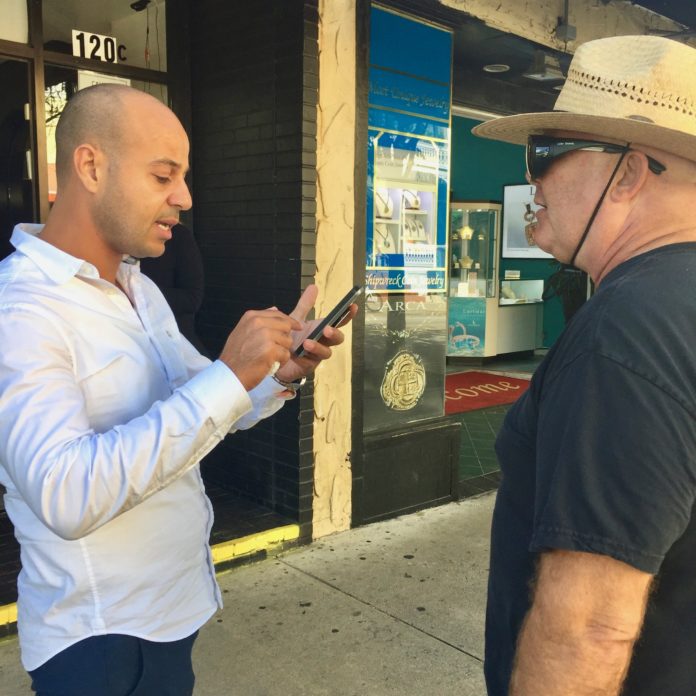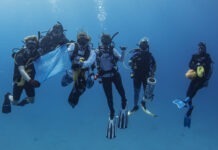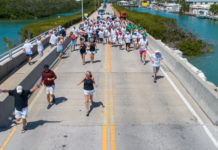
“Can I ask you a question?”
“I have a sample for you.”
“I have something for your eyes.”
“Can I show you something?”
These are the questions – or more like hooks – heard from nicely dressed, attractive, young, mostly international sales associates from doorways on Duval Street. They are offering samples of skin creams or bits of soap at one of the now nine “Cosmetic” shops littering downtown Key West. Their goal: to get customers into the store and sell their product. The problem isn’t the commerce, but the cosmetic stores history of city ordinance violations and documented unscrupulous pricing and sales tactics: mainly, the exploitation of Key West’s vital tourist industry, targeting cruise ship passengers and senior citizens, mostly women.
For the past six years these shops have been on the rise and are reminiscent of Key West’s battle with T-shirt shops in the mid-’80s. The T-shirt shops blighted the community with profanity-laden windows and misrepresentation of pricing.
“These kind of shops change the face of Duval and sacrifice the reputation of Key West,” said Commissioner Jimmy Weekley. “The overall effect is tourists feel ripped off after coming to Key West, and it adversely affects the honest businesses, especially if potential customers are racing past stores to avoid the barkers in the doorway.”
Now, Key West is reacting to the next generation of shell game shops. The problem came to light back in spring 2015 when an elderly, mentally ill woman was charged a whopping $40,000 in face creams, and retired Ohio newspaper publisher Bruce Mitchell stepped into action. Mitchell, who had just moved here permanently after visiting for decades, was outraged after reading about the incident. He felt compelled to picket the shops with “Rip Off Stores” signs until they agreed to return the money. Retired business man Tevis Wernicoff decided to join him and the duo began the Rapid Response Rip Off Team, responding to customer complaints, working with code enforcement, going before the city commission and advocating for refunds which so far has totaled more than $57,000. These two are definitely mad as hell and not going to take it any more.
The biggest offense is the “samples” the stores offer, for which customers are later charged without notice of cost before purchase; the result can be thousands of dollars. The sales tactic is to first get the customer in the shop, then apply a sample product. Often the product can appear to work; then the goal becomes to introduce more products. “I have something for your eyes,” is often a great hook for women and their achilles heel, crow’s feet. Sales people then quote large prices such as $5,000 for a product, then lower or maintain that price depending on the reaction of the customer. And if the customer decides to purchase the product, the sample could be added as an additional cost, racking up outrageous bills. If the customer refuses to pay, then there is the threatening of police involvement, which no tourist foreign or domestic who has just a few hours in Key West wishes to endure. So they pay.
“Not one of these shops hasn’t broken an ordinance. They are amazingly aggressive, forcing their employees to work almost all on commission, making them desperate,” said Mitchell, who estimates there are more than 100 employees within the shops. Mitchell has spoken to three informants/employees and learned these young sales people are commonly here on overstayed tourist visas and do not make pay without sales. Also, the shops tend to change owners quickly, making it difficult to track down the culprits, according to Mitchell. But he is equally aggressive about threatening to picket shops if owners do not sign a notarized consent form, vowing to return money and practice ethical business. Owners must agree to a 30-day return policy and store owners must actually accept the returns. (Mitchell has learned that they often refuse to sign UPS or Fed Ex forms in order to refuse return of payment.) Also, they must follow city ordinance, disclosing sales costs prior to purchase; not smoke or throw cigarette butts on the street, grab or touch customers; and lastly, any purchase over $1,000 must require owner authorization.
Do these forms of consent work? They are a stopgap at least.
The City Commission has begun to address the issue, with overwhelming support from the commissioners and City Attorney’s office at the last commission meeting. As with the T-shirt shops, Weekley said, “We need to be on it and find ways to legislate and create ordinances.”
What will the city do? See part two in the next edition January 19.
What’s with the soap? Who wants a sample of unwrapped, colorful soap, presented bite-sized on doilies on a caterer’s tray? It is a tactic to draw customers into the store, offering to wrap the soap, or offering unwitting passersby water to rinse out their mouths, after — yes – they have eaten the soap. Both scenarios get people in the door and then the real sales pitch begins.
“This is not unlike the Dead Sea Scam that was brought to light around the world a few years ago” – Bruce Mitchell, of the Rapid Response Rip Off Team.
























